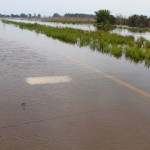Nebraska cities along the Missouri River are still waiting for nearly $7.2 million in reimbursement from state and federal agencies, more than three years after extensive flooding.
Five cities have yet to receive payments between $275,000 and nearly $4 million, the Omaha World-Herald reported. Omaha is owed the most at $3.6 million, and city officials say private insurance has paid the majority of the city’s $26.7 million in expenses.
Grants from the Nebraska and Federal Emergency Management Agencies have helped pay for flood damage and recovery, but Nebraska still owes 43 percent of the nearly $17 million submitted in flood claims.
Meanwhile, the Iowa Homeland Security and Emergency Management has paid all but 5 percent of its $38.6 million in claims.
 The flooding was due to a large Rocky Mountain snowpack, followed by a wet spring, which caused extensive flooding along the Missouri River in Nebraska and Iowa.
The flooding was due to a large Rocky Mountain snowpack, followed by a wet spring, which caused extensive flooding along the Missouri River in Nebraska and Iowa.
Dan Berlowitz, a city administrator in Bellevue, Nebraska, where water rose to a city park’s basketball hoop rims, called the NEMA process “lengthy and frustrating.”
The city has had 49 phone calls and emails with the agency’s staff for 13 flood projects its undertaken. It’s owed $1.6 million, and while it has enough in financial reserves to cover the cost, it still puts a strain on the city, said Finance Director Rich Severson.
Smaller cities with little to no reserve funds have had to apply for loans and pay interest. South Sioux City’s treasurer Nanci Walsh said the city, which is owed $1.4 million, has been paying about $2,000 a month in interest since fall 2011.
Bryan Tuma of NEMA said processing claims takes a lot of time and work. He also said the state has had other disasters, including the 2012 wildfires in the western part of the state and the June tornado in Pilger, to address and doesn’t have enough staff available. The department employs 37 people.
“We’re trying to process as quickly as we can,” Tuma said. “It’s a tricky staffing issue. You get a surge of disasters, and you’re tasked with responding to those, and the workload swells.”
Topics Flood
Was this article valuable?
Here are more articles you may enjoy.


 US Supreme Court Rejects Trump’s Global Tariffs
US Supreme Court Rejects Trump’s Global Tariffs  World’s Growing Civil Unrest Has an Insurance Sting
World’s Growing Civil Unrest Has an Insurance Sting  Florida Regulators Crack the Whip on Auto Warranty Firm, Fake Certificates of Insurance
Florida Regulators Crack the Whip on Auto Warranty Firm, Fake Certificates of Insurance  Former Broker, Co-Defendant Sentenced to 20 Years in Fraudulent ACA Sign-Ups
Former Broker, Co-Defendant Sentenced to 20 Years in Fraudulent ACA Sign-Ups 

